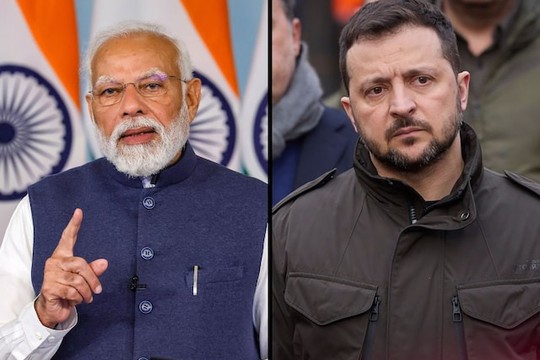Modi and Zelensky
The international geopolitical landscape is becoming more perilous. The Ukraine conflict continues on without any solutions in sight. Tensions in the western Pacific between China and the Philippines are rising, and this is in addition to the continuing volatility of the Taiwan issue. A third area of potential regional strife involves Iran and Israel, writes Kanwal Sibal, a retired Indian foreign secretary and former Ambassador to Russia, he also held ambassadorial positions in Turkey, Egypt, France and was Deputy Chief of Mission in Washington DC.
The Ukraine conflict is the most critical as it pits the two most powerful countries, the erstwhile Cold War antagonists, against each other in an actual, albeit indirect, military conflict in which a dangerous nuclear dimension is involved, even as the existing arms control agreements have broken down.
In Ukraine – even though the situation on the ground has moved in Russia’s favor, and the earlier goal of the US and EU of inflicting a strategic defeat on Russia through a proxy war (by arming and funding Ukraine) has not been realized – there is so far no sign of willingness to genuinely explore a negotiated solution. The West is finding it difficult to remove itself from the coils of a policy in which it is trapped. Ukraine is being treated as the last frontier of Europe facing a ‘non-European’ Russia (!?).
Support in the US for funneling more weapons and money into Ukraine has been diminishing, even as a new $60.8 billion Ukraine aid bill is moving through the legislative process towards approval.
The EU wants to prepare for the eventuality (especially if Donald Trump is reelected) of the US watering down support for Ukraine, and is willing to accept more responsibility for arming and funding Kiev. To this end, Western European countries have increased their defense budgets and intend to build stronger military capabilities of their own.
The president of the European Commission and the NATO secretary-general are fueling the war mood with their hawkish discourse against Russia, instead of lowering the rhetoric to pave the way for dialogue and diplomacy.
This is despite the fact that EU economies are not doing well and social unrest is growing. Farmers, particularly in Poland, are protesting against the flow of Ukrainian grain and other agriculture products into the EU as their interests are being hurt. This is ironic as the export of Ukrainian grain from Black Sea ports disrupted by the conflict required the opening of an alternative route through Europe to sustain Ukrainian agriculture.
The possibility of a diplomatic breakthrough on the Ukraine issue is low at this stage.
While war fever is being nurtured by the West, moves are also afoot to hold an international peace conference in Switzerland this June on Zelensky’s ten-point peace proposal. It is maximalist in scope and has been dismissed by Russia, which has said it is willing to negotiate, but on a realistic basis that recognizes the territorial changes on the ground.
Switzerland and Ukraine are active in gathering support for the proposed peace conference, especially from Global South countries. Four closed-door meetings to prepare for this conference have already been held, but without Russia’s participation. Clearly, a peace conference without Russian participation makes little sense. Moscow cannot be presented with a framework for peace in which it has had no role. The strategy seems to be to mobilize as many countries as possible, especially from the Global South, so that the blueprint for peace can be presented as the view of the larger international community, to which Russia would need to be responsive.
To promote the peace summit, both the Swiss and Ukrainian foreign ministers have visited India to press for its participation in the belief that this will encourage other Global South countries to attend. As for the agenda, India is told that it can pick up those points in Zelensky’s ten-point proposal to which it has no objections, and that could be the basis of its participation.
All of this suggests that the conference is a ploy to diplomatically isolate Russia by demonstrating that Ukraine wants peace and the Global South is in favor of dialogue, but Russia is recalcitrant.
India has consistently favored dialogue and diplomacy to end the Ukraine conflict. For the sake of consistency, it cannot ab initio reject any initiative, however deficient, to discuss peace and decline to take part. It therefore participated in earlier closed-door meetings on Ukraine’s ‘peace summit plan’.
A G7 meeting is being held in Italy on June 13-15, to which the Indian prime minister has been invited. The Ukraine peace summit is slated for June 15-16, which would normally make it convenient for Narendra Modi to attend it immediately after the G7 summit concludes.
However, the results of the current general election in India will be declared on June 4, which means that if Modi’s party – the BJP – wins, as is anticipated, the prime minister will be preoccupied with post-electoral ceremonies and cabinet formation, and can hardly be away from the country. At best, he could attend the G7 summit for a day and hurry back home.
read more in our Telegram-channel https://t.me/The_International_Affairs

 11:21 27.04.2024 •
11:21 27.04.2024 •























